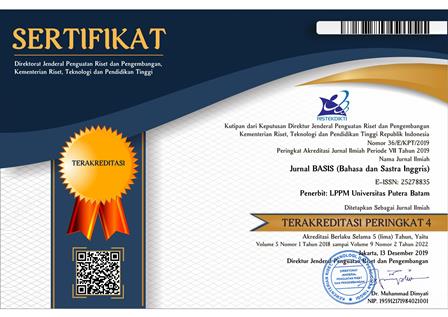SOCIO-AFFECTIVE STRATEGIES IN ENHANCING STUDENTS’ SPEAKING MOTIVATION
DOI:
https://doi.org/10.33884/basisupb.v6i1.1051Keywords:
Socio-Affective Strategies, Teaching SpeakingAbstract
This study investigated the use of socio-affective strategies to enhance the students’ motivation in speaking. Therefore, the purposes of the study were to find out the teacher’s way of using socio-affective strategies to enhance students’ motivation in speaking and to describe students’ perception toward socio-affective strategies in enhancing their motivation in speaking. A case study was used as a research design of this study. The data were collected through classroom behaviour observation, interview, and questionnaire. Furthermore, the writer used data triangulation technique to make the research result more valid. The finding of this study showed that there are six ways in using socio-affective strategies in teaching speaking; reducing students’ anxiety, encouraging students in speaking, controlling students’ emotion, asking question, cooperating with others, and empathising with others. The data also indicated that students have positive perception on using socio-affective strategies to enhance their motivation in speaking.
References
Ary,D. Jacobs, L, C. Scrensen, C. (2010). Introduction to Research in Education Eight Edition. Canada: Nelson Education, Ltd.
Babaee, N. (2012). Motivation in Learning English as a Second Language; A Literature Review. Canadian Journal for New Scholars in Education. 4(1). 1-7
Bakar, R. (2014). The Effect of Learning Motivation on the Student’s Productive Competencies in Vocational High School, West Sumatra.International Journal of Asian Social Science.4(6).722-732.
Behtash, E, Z. Saed, A. Sajjadi, F. (2016).The Effect of Storytelling Technique on Speaking Ability of Female Iranian Intermediate EFL Learners.International Journal of Applied Linguistics & English Literature.5(1).209-214.
Derakhshan, A. Khalili, A, N. Beheshti, F. (2016).Developing EFL Learner’s Speaking Ability, Accuracy and Fluency.English Language and Literature Studies.6(2).177-186.
Gani, S, A. Fajrina, D. Hanifa, R. (2015). Students’ Learning Strategies for Developing Speaking Ability.Studies in English Language and Education.2(1).16-29.
Guest, G. (2000). Field Methods. Sage Publications, Inc. 12(4).346-357.
Hamzah, M, S, G. Shamshiri, K. Noordin, N. (2009).Effect of Socio-Affective Strategy training on Listening Comprehension.European Journal of Social Sciences.11(4).690-697.
Kahraman. F,G. (2013). The Effective of Socio-Affective Language Learning Strategies and Emotional Intelligence Training on English as a Foreign Language (EFL) Learners’ Foreign Language Anxiety in Speaking Classes.Bilkent University.
Parra, Y. J. F. (2010). Explicit Teaching of Socio-Affective Language Learning Strategies to Beginner EFL Students.Ikala, Sevista De Lenguage &Cultuza.15(24). 145-169.
Ryan, R. M., & Deci, E. L. (2000). Intrinsic and Extrinsic Motivation: Classic Definition and New Directions. Contemporary Educational Psychology, 25, 54-67.
Ryan, R. M., & Deci, E.L. (2000). Self-Determination Theory and the Facilitation of Intrinsic Motivation, Social Development, and Well-Being. American Psychologist. 55(1) 68-78.
Saeed, S& Zyngier, D. (2012). How Motivation Influences Student Engagement: A Qualitative Case Study. Journal of Education and Learning. 1(2). 252-267.
Tajzadeh, P. Khodabandehlou, M. Jahandar, S. Najafi, M. (2013).The Impact ofSocio-Affective Strategies on Iranian Intermediate EFL Learner’s Speaking Ability.Indian Journal of Fundamental and applied Science. 3(3).670-674.
Tse, A. Y. (2011). A Comparison of Language Strategies Adopted by Secondary and University Students in Hong Kong. International Journal of Business and Social Science.2(11).29-34.
Vlckova, K. Berger, J. Volkle, M. (2013). Classification Theories of Foreign Language Learning Strategies: An Exploratory Analysis. Studia Paedagogica. 18(4).94-113.
Wang, F. X. (2008). Motivation and English Achievement: An Exploratory and Confirmatory Factor Analysis of a New Measure for Chinese Students of English Learning. North American Journal of Psychology. 10(3). 633-646.
Ziahossaeini, S,M. & Salehi, M. (2008).An Investigation of the Relationship between Motivation and Language Learning Strategies.Special Issue, English. 41. 85-107.
Downloads
Published
Issue
Section
License

















